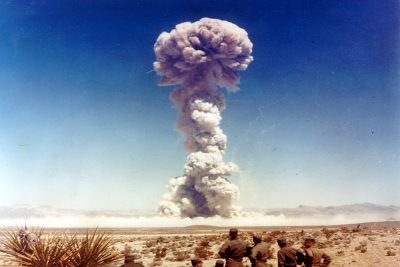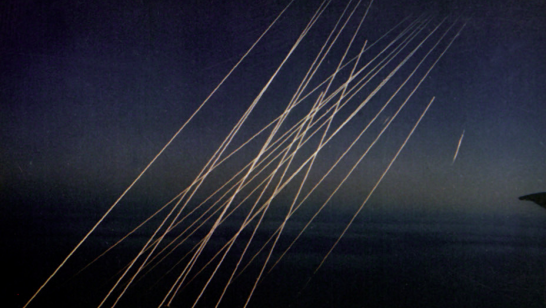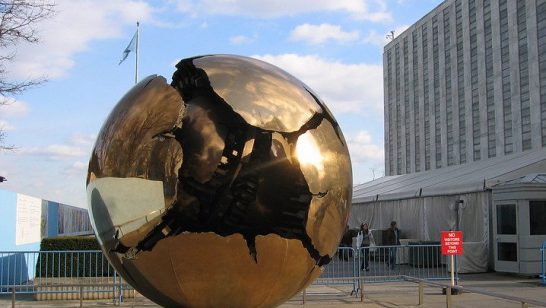This week sees the first conference of states parties to the Treaty for the Prohibition of Nuclear Weapons (TPNW 1MSP), which brings together over 60 governments that have ratified the Treaty and will also be observed by a number of NATO member states. It was preceded by the fourth international conference on the humanitarian impact of nuclear weapons, which assessed the wide-ranging consequences of nuclear weapons on issues from health to development to climate, and to raise awareness of the catastrophic nature of any nuclear weapons use. The president-designate of the TPNW conference, Alexander Kmentt, a member of the ELN, met with fellow ELN members to brief us on expectations of these conferences and discuss the likely impact.
Following an extensive global civil society campaign for governments to ratify the TPNW, the MSP1 is bringing together diplomats tasked with taking the treaty forward. The discussion identified four points in particular that are likely to be communicated from the meeting to the wider international community.
Firstly, diplomats from states parties want to emphasise the seriousness of this enterprise. It was noted that tens of parliaments around the world have looked at the arguments seriously and have taken the decision to ratify the treaty because they are convinced that the risks that nuclear weapons pose to international security outweigh the perceived benefits. Support for the TPNW should not be caricatured as being pacifist or underestimating the need for security, but is rather a judgement about fundamental security interests, it was said. Supporters of the TPNW do not necessarily believe that deterrence is a myth. Some do. But others simply judge that deterrence cannot be relied on indefinitely, and that the costs of it failing are too great to be worth the risk, because these weapons represent an existential risk to humanity.
Secondly, the parties to the treaty are keen to emphasise that they believe it is a complement to the Nuclear Non-Proliferation Treaty, not a rival, given that NPT Article VI commits its signatories to a treaty on general and effective nuclear disarmament and to effective measures to disarm. It was said that it is too early to assess the repercussions of the Ukraine war for nuclear deterrence. However, the risks of a possible nuclear escalation have become more tangible in the eyes of many. It was argued that the entire nuclear regime seemed to be at stake, and the core problem stems from states failing to implement their existing obligations, not from those who are seeking to invest in new multilateral instruments.
Thirdly, the conference will clearly reconnect to the foundations of the treaty in terms of humanitarian consequences and existential risk, putting humans and humanity at the centre. One of the novel aspects of the treaty are the “positive obligations” to deal with the harm of past nuclear use and testing, including remedies and assistance for victims who have suffered significant social and economic impacts.
Our discussion emphasised that the work being undertaken to understand and mitigate against the humanitarian consequences of nuclear weapon is separate from the TPNW. The signatories of the TPNW believe the best way to prevent the catastrophic consequences of nuclear use is to ban nuclear weapons. But the concern about humanitarian consequences and risks is much broader, and is also a motivating factor for those working on nuclear risk reduction more generally. For instance, ELN members have a variety of views on the TPNW. A significant number of our members have supported the work led by the Austrian government to account for the humanitarian consequences of nuclear weapons, but have not gone on to support the TPNW.
Fourthly, it was noted, the TPNW parties are keen to engage with those that are sceptical. Much of the discussion around the TPNW has been black-and-white, bad-tempered and blame-oriented. Ultimately there is a strong common interest for everyone in reducing the catastrophic risks of nuclear war, it was said (even if there are differences over the definition of nuclear risks as TPNW supporters regard the existence of nuclear weapons as inherently risky). Opportunities for dialogue and bridge-building are presented by the decisions of several states who have no intention of ratifying the Treaty in the foreseeable future to join as observers, including Germany, Australia, Belgium and Norway among others.
The treaty is designed to become universal, and it was noted that it foresees two pathways for nuclear armed states to join eventually. One is to give up these weapons, have that verified and then join without weapons. The other is to join with weapons with an agreed process to eliminate them. One of the tasks of the meeting of states parties this week will be to decide on the maximum deadline for such a process. In the meantime, it was emphasised that any and all progress in reducing the chances of nuclear weapons being used is necessary and welcome.
Image: Flickr, Friends of Europe.



